How to Choose the Right Wheels for Your Car: A Comprehensive Guide
March 14, 2023
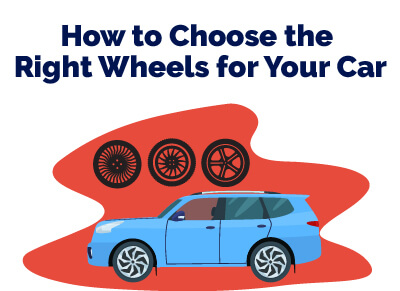

Michael Collado is a car buying expert and has been a professional automotive writer since 2009. He’s written about dealership sales, vehicle reviews and comparisons, and service and maintenance for over 100 national automotive dealerships. Previously, Collado was a copywriter at the ad agency TBWA/Chiat/Day where he worked on brand campaigns for Nissan, ABC Television, Sony PlayStation, and Energizer. His recognition in the ad industry includes awards from Communication Arts and The Clios.
Collado has a Bachelor’s degree from the University of South Florida, with a major in Psychology and a minor in Marketing.
Choosing the right wheels can make a significant difference in the performance, appearance, and overall value of your car.
Whether you are buying new wheels for aesthetic reasons or to improve your car's performance, it is essential to have a clear understanding of the different types of wheels that are available.
Our team has created a comprehensive guide to help you choose the right wheels for your car.
Table of Contents
Types of Wheels
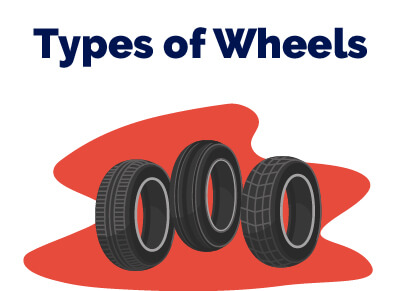 There are several types of wheels available in the market, including steel wheels, alloy wheels, forged wheels, and carbon fiber wheels. Each type of wheel has its unique features and benefits.
There are several types of wheels available in the market, including steel wheels, alloy wheels, forged wheels, and carbon fiber wheels. Each type of wheel has its unique features and benefits.
Steel Wheels
Steel wheels are the most commonly used wheels in the automotive industry. They are affordable, durable, and easy to maintain, making them an ideal choice for many car owners. The primary advantage of steel wheels is their affordability. They are the most budget-friendly option and offer excellent value for money.
However, steel wheels are heavy, and their weight can affect your car's performance. They are also prone to rust and corrosion, especially in areas with harsh weather conditions. Moreover, they are not very aesthetically pleasing, and they do not offer many design options.
Alloy Wheels
Alloy wheels are the most popular type of wheels among car enthusiasts. They are made from a combination of aluminum and other metals, making them lightweight and more durable than steel wheels. Alloy wheels also offer better heat dissipation, which helps improve your car's braking performance.
The primary advantage of alloy wheels is their aesthetic appeal. They come in a wide range of designs, finishes, and colors, allowing you to customize your car's look. They are also more durable than steel wheels and resistant to rust and corrosion.
However, alloy wheels are more expensive than steel wheels. They are also prone to cracking and bending if they encounter potholes or other road hazards. Moreover, they require more maintenance than steel wheels, and their finish can fade over time.
Forged Wheels
Forged wheels are the strongest and most durable type of wheels available in the market. They are made from a solid piece of aluminum, which is heated and then compressed under high pressure to create a dense, strong structure. Forged wheels are lighter than alloy wheels and offer better strength and stiffness, making them ideal for high-performance cars.
The primary advantage of forged wheels is their strength and durability. They can withstand the toughest driving conditions and are less prone to bending or cracking. They also offer better heat dissipation, which helps improve your car's braking performance.
However, forged wheels are the most expensive type of wheels, and they offer limited design options. They also require more maintenance than alloy wheels, and their finish can fade over time.
Carbon Fiber Wheels
Carbon fiber wheels are the most expensive and exotic type of wheels available in the market. They are made from a composite material that combines carbon fiber with resin. Carbon fiber wheels are incredibly lightweight, which helps improve your car's acceleration and handling.
The primary advantage of carbon fiber wheels is their weight. They are the lightest type of wheels available, and their low weight can improve your car's performance significantly. They also offer a unique, exotic look that cannot be matched by any other type of wheel.
However, carbon fiber wheels are the most expensive type of wheels, and they offer limited design options. They also require more maintenance than other types of wheels, and they can be more prone to cracking.
Factors to Consider When Choosing Wheels
When shopping for car wheels, you will want to consider a number of factors before making your final purchasing decision.
Here are the top six factors that you should consider.
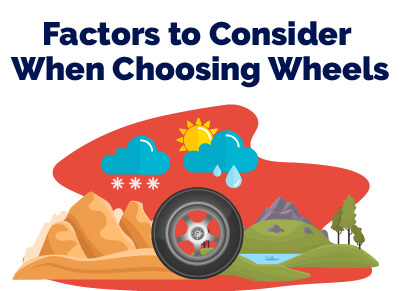 1. Size
1. Size
The size of the wheel is one of the most critical factors to consider when choosing car wheels. The wheel's size will have an impact on the vehicle's performance and handling.
Typically, the size of the wheel will be listed as a series of three numbers: width, diameter, and offset.
2. Offset and Backspacing
Offset and backspacing refer to the distance between the wheel's centerline and the mounting surface. The offset will determine how the wheel sits in relation to the car's suspension and the width of the wheel. Backspacing will determine how far the wheel extends into the wheel well.
It's essential to choose the right offset and backspacing to ensure proper fitment and handling.
3. Bolt Pattern
The bolt pattern refers to the number of bolts on the wheel and the distance between them. The bolt pattern should match the car's hub to ensure proper fitment.
Choosing the right bolt pattern is crucial to ensure the wheels are secure and do not cause any safety issues.
4. Load Rating
The load rating is the amount of weight the wheel can handle.
It's essential to choose a wheel with the appropriate load rating to ensure safety and prevent damage to the car's suspension and tires. The load rating is typically listed on the wheel or in the wheel's specifications.
5. Style and Design
The style and design of the wheel are also essential factors to consider. The style and design will affect the car's appearance and overall aesthetic.
It's important to choose a wheel that matches the car's style and enhances its overall look.
6. Price
Price is also a critical factor to consider when choosing car wheels. Wheels can vary greatly in price, and it's important to choose a wheel that fits within your budget.
It's essential to balance price with other factors to ensure you get the best value for your money.
Benefits of Choosing the Right Wheels
The right wheels on your car do more than enhance appearance. In fact, there are a number of surprising benefits of getting the right wheels for your car. Here’s what the right wheels can do for your vehicle.
Improved Performance
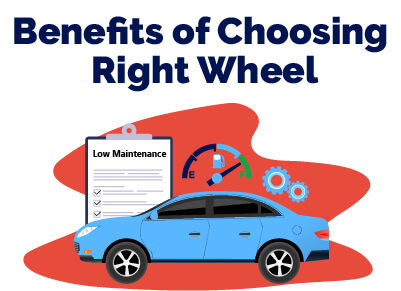 By selecting the right size and offset, you can improve the car's handling and stability, making it easier to control and maneuver.
By selecting the right size and offset, you can improve the car's handling and stability, making it easier to control and maneuver.
Properly fitting wheels can also improve acceleration, braking, and cornering, leading to an overall better driving experience.
Better Aesthetics
Choosing the right wheels can also enhance the appearance of your car. The style and design of the wheels can significantly impact the car's overall look, giving it a more aggressive, sporty, or sophisticated appearance.
A well-matched set of wheels can transform the car's aesthetics and make it stand out on the road.
Increased Resale Value
Upgrading your car's wheels can also increase its resale value. Choosing high-quality, well-maintained wheels that complement the car's style and performance can make it more appealing to potential buyers.
It's a simple and effective way to increase the car's value and potentially recoup some of the cost of the wheels themselves.
Enhanced Safety
Choosing the right wheels is also crucial for safety. Wheels that are the wrong size, offset, or bolt pattern can cause issues with handling and stability, leading to potential accidents.
Choosing wheels with the appropriate load rating is also essential to ensure that they can handle the weight of the vehicle.
Making The Right Choice When it Comes to Your Vehile’s Wheels
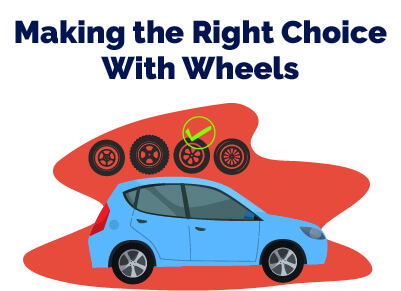 Choosing the right wheels for your vehicle can bring several benefits. Firstly, it can enhance the overall look of your car, giving it a sleeker, more stylish appearance.
Choosing the right wheels for your vehicle can bring several benefits. Firstly, it can enhance the overall look of your car, giving it a sleeker, more stylish appearance.
Secondly, the right wheels can improve your car's performance, providing better handling, stability, and traction. It can also help in reducing the braking distance and improve fuel efficiency.
When shopping for car wheels, it is essential to consider factors such as size, material, and design. The size of the wheels should match the vehicle's specifications to ensure proper fit and function. The material should be strong and durable, such as aluminum or steel.
The design can vary based on personal preference, but it should complement the overall aesthetic of the vehicle.
It is also important to consider the cost, warranty, and customer reviews before making a final decision.
Best Car Deals by Category
Frequently Asked Questions
How do I determine the correct wheel size for my car?
Determining the correct wheel size for your car can be done by checking the owner's manual or the tire placard, which is typically located in the driver's side door jamb. The tire placard will provide information on the recommended tire size, which can be used to determine the corresponding wheel size.
Can I upgrade my wheels without affecting the car's performance?
Upgrading your wheels can potentially affect your car's performance, depending on the size and weight of the new wheels. Larger wheels can add weight to your vehicle, which can result in slower acceleration and decreased fuel efficiency. However, if the new wheels are of similar weight and size to the original wheels, the impact on performance should be minimal.
How do I choose the right wheel finish for my car?
When choosing the right wheel finish for your car, it is important to consider the overall aesthetic of the vehicle. Chrome, black, and silver finishes are popular choices, but the finish should complement the color and style of the car. It is also important to choose a finish that is durable and resistant to corrosion.
Can I install larger wheels on my car?
Installing larger wheels on your car can be done, but it is important to consider the potential impact on performance. Larger wheels can affect your car's acceleration, braking, and handling, and may require additional modifications such as suspension upgrades. It is recommended to consult with a professional to ensure that the new wheels are compatible with your vehicle.
Will different wheels affect my car's fuel economy?
Different wheels can potentially affect your car's fuel economy, particularly if the new wheels are heavier or larger than the original wheels. The additional weight can result in decreased fuel efficiency and increased fuel consumption. However, if the new wheels are of similar weight and size to the original wheels, the impact on fuel economy should be minimal.
Posted in Car Buying Tips, Car Troubleshooting |




